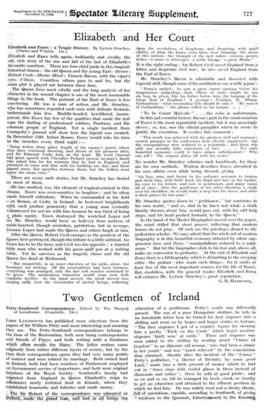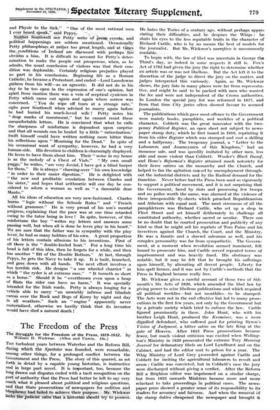Two Gentleiiien of Ireland
. -
Petty-Southvvell Correspondence. Edited by The Marquiii of Lansdowne. (Constable. 24s.) LORD LANSDOWNE has published more selections from the Papers of Sir William Petty and most interesting and amusing they are. The Petty-Southwell correspondence belongs to the time of the Restoration, both men being contemporaries and friends of Pepys, and both writing with a frankness which Often recalls the Diary. The letter writers came originally from rather different layers of society, but by the time their correspondence opens they had very many points of contact and were related by marriage. Both owned land in Ireland, both had been members of Parliament employed on Government service of importance, and both were original Members of the Royal Society. Southwell's family had rigmted_ from England in Queen Elizabeth's reign to iithinister newly forfeited land in Kinsale, where they established ironworks and fisheries and made money. • • :The Sir Robert of the correspondence was educated at 04 „ ,t_rnade the granriour, aorSrlg aJJthings thg. education of a gentleman. Petty's youth was differently passed. The son of a poor Hampshire clothier, he tells in an inimitable letter how he turned his first sixpence into a 'Shilling and went on by larger and larger strides to fortune. .:" The first sixpence I got of a country Squire for shOWing him a pretty ' Trick on the Cards ' which begot another Sixpence `fairly won' at cards." Three and sixpence was soon added to the shilling by reading aloud " Crums of Comfort" to an illiterate old woman " who had been a sinner 'in her youth" and was "'much relieved" by the consolatiOn thus obtained. Shortly after the incident of the " Crum's' Petty's godfather, "a Doctor of Divinity by -some gOOd Luck,"- made him a little present of money which he laid out in " brase rings with cooled glasse in - them instead of 'diamonds and rubies " ; these he sold at good profit ; and SO. on and so on, till he managed by hook, crook, or charity to get an education and attained to the affluent position' hi Which we find him. He was widely read and a showy &wine, full of quotations, capable, according to Southwell, of giving :'i'lyisdome to the Ignorant, Entertainment to the Knoisit
and Physic to the Sick." " One of the most rational men I ever heard speak," said Pepys. -
likither SOuthivell nor- Petty write of greibilr exents, and political happenings are seldom mentioned. OccasionallY Petty philosophizes at rather-too great; length; and- at ti/mes the.sconditions ' of Ireland are discussed with perhaps .*o obvidus a bias. It is difficult to account for Petty's deter- mination to make the people out prosperous, when, as he admits, the usuat conclusion of visitors was that their con- dition was deplorable. Certainly religious prejudice played no part in his conclusions. Beginning life as a Roman Catholic, he became a Protestant, and ended—Lord Lansdowne gathers from his will—as an agnostic. It did not do in his day to be too open in the expression of one's opinion, but aplitt from Caution there was a vein of sceptical cynicism in Petty which came out again and again where sorrow was concerned. " You do wipe off tears at a strange rate," sighs poor Southwell when advised to marry again before he had buried his much-loved wife ! Petty notes his " deep marks of resentment," but he cannot resist these uncomfortable letters. He is convinced that what he calls the sharpness of misfortune is dependent upon surprise and that all wounds can be healed by a little " ratiocination.' Swift himself could have written nothing more bitter than his reflections upon " Mourning for the Dead." In spite of his occasional want of sympathy, however, he had a very human side. His devotion to children is charmingly displayed. He loves to have them about him. Their " noise in my house is as the melody of a Chest of Viols." " My own small puggs," he writes, " are very Jovial, I have got a blind harper for them." He is always " Chawing-over " his own knowledge " in order to their easier digestion." He is delighted with " the new and profitable- emulation between Charles and his Sister," and hopes that arithmetic will one day be con- sidered to adorn a woman as well as " a damnable dear Manto."
. All his ideas of education are very new-fashioned. Charles learns " logic without the Schoole Rules " and " French without grammer." He is very proud of his son's mental progress, explaining that the pace was at one time retarded owing to the tutor being in love ! In spite, however, of this misfortune the boy " writes my letters and answers some paissing well, but when all is done he loves play in his heart." We are sure that the father was in sympathy with the play loves:, he had so many hobbies of his own. A great proportion of his letters contain allusions to his inventions. First of all there is the " double-keeled boat." For a long time his head is full of this idea, then he forgets for a while, and then has another " fitt of the Double Bottom." At last, through Pepys, he gets the Navy to take it up. It is built, launched, and goes: down with all hands. The next effort involves a less terrible risk. He designs " a one wheeled charriot " in which " the ryder is at extreme ease." " It turneth as short as a horse." Should it be overthrown even upon a heap of flints the rider can have no harm." It was specially intended for the Irish roads. Petty is always longing for a vehicle able to carry " an unwieldy infirme and blindish caress over the Rock and Bogs of Kerry by night and day in all weathers." Such an " engine " apparently never materialized, otherwise we hardly think that its inventor would have died a natural death I



















































 Previous page
Previous page